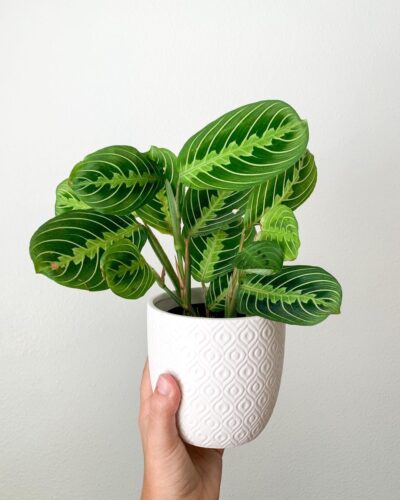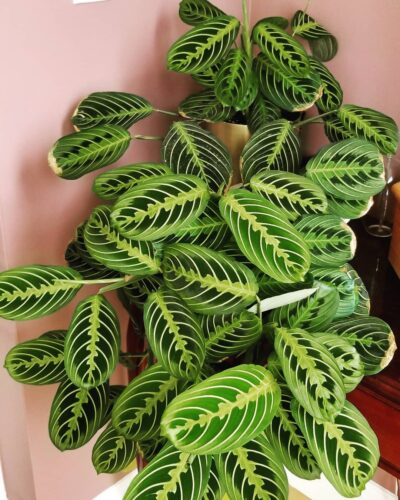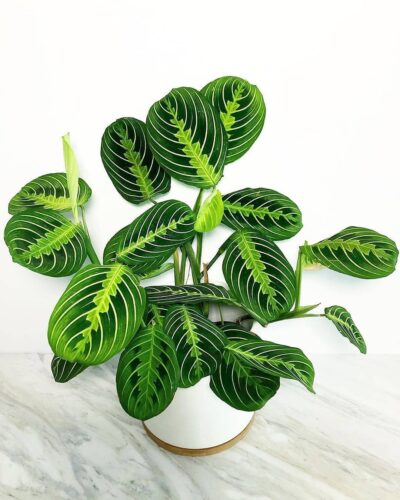The Lemon Lime Maranta Prayer Plant is a beautiful specimen with variegated leaves; include it in your home garden for a distinct look.
The Lemon Lime Maranta Prayer Plant can be a colorful addition to your indoor or outdoor garden. Read how you can include this plant in your collection.
Botanical Name: Maranta leuconeura ‘Lemon Lime’
Read: Are Prayer Plants Toxic to Dogs?
Lemon Lime Maranta Prayer Plant Information

Native to Brazil, Asia, and Africa, this plant is also known as Lemon Lime Maranta and Maranta ‘Lemon Lime.’ This tropical plant can grow up to 1 foot tall and 14 inches wide.
The lime-green oval-shaped leaves close in the morning and open again in the evening. The patterned foliage has deep veins and markings in deep green to burgundy hues.
In summer, if kept outdoors, this plant offers tiny purple or white blooms on long stems. These blooms last for a day and rarely appear indoors.
Read: How to Grow Conophytum Pageae
How to Propagate Lemon Lime Maranta Prayer Plant
You can propagate the Lemon Lime Maranta Prayer plant from cuttings, division, and air-layering. The best and easiest method for propagation is through stem cutting; learn the directions below.
- Cut a healthy 6-8 inches long Lemon Lime Maranta Prayer Plant stem cutting with a few leaves below the node using clean, sharp scissors.
- Discard the bottom leaves, leaving a few foliage at the top.
- Dip the cut ends in rooting hormone, though it is optional.
- Now, fill a jar with non-chlorinated water and insert the cutting into it. You can also propagate the stem cuttings in a moist potting mix.
- Place the pot in a warm area with bright, indirect light.
- The root will develop in up to 2-4 weeks; at this time, you can move the cuttings to a pot filled with fresh, well-draining soil
Read: Tips to Grow Spanish Moss
Ideal Growing Conditions for Lemon Lime Maranta Prayer Plant

Light
Keep the plant in an area with bright, indirect light. Avoid exposing the plant to direct, harsh sunlight. Excessive light can curl the leaves of prayer-plants. If you notice this thing, then immediately move the plant to a location with dappled light.
Soil
Use a light, airy, peat-based, well-draining potting mix with a pH of 5.5-6; you can purchase commercial soil as well. You can make potting soil on your own by blending perlite, potting soil, coco coir, or peat moss.
Water
Water the plant using non-chlorinated room temperature water. You can use distilled, filtered, or rainwater for this purpose. Keep the soil evenly moist but not waterlogged.
Reduce watering in fall and winter dormancy.
Temperature and Humidity
This plant is winter hardy in USDA zones 11 and higher. Grow lemon lime maranta in areas with warm temperatures of 60-70 F.
The Lemon Lime Prayer plant prefers high humidity; you encourage it by using a humidifier or a pebble tray filled with water. Avoid misting the plant, as it can lead to fungal infections.
Read: Shangri La Pothos Care Guide
Lemon Lime Maranta Prayer Plant Care

Fertilizer
Feed the lemon-lime prayer plant from spring till late fall with balanced liquid fertilizer for houseplants at half strength every couple of weeks. Avoid feeding the plant in fall and winter.
Pruning
Prune the plant to keep it in good shape, and remove yellow, dead, or damaged leaves regularly. Schedule a comprehensive pruning at the end of winter; it will promote new growth in spring.
Repotting
Maranta plants prefer root-bound states, though you can repot them annually during spring. The Lemon Lime plant grows quickly, so choose 1 or two size shallow containers. Use fresh potting mix, water thoroughly, and keep a pot in a shaded area for a week so it acclimatizes.
Pests and Diseases
Problems in lemon-lime plants occur due to improper watering. Overwatering can cause leaf spots root and stem rot. While underwatering results in curly, brown leaf tips.
Do remember incorrect watering leads to an infestation of pests like mealybugs and spider mites. You can treat these issues by using neem oil or insecticidal soap.
Toxicity
Lemon-lime prayer plant is not toxic to pets and kids.



